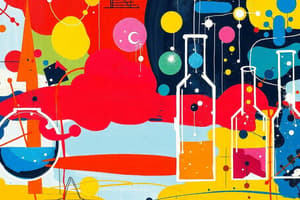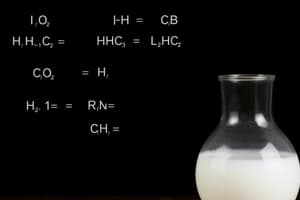Podcast
Questions and Answers
What is a chemical reaction?
What is a chemical reaction?
- The process by which the atoms of one or more substances are rearranged to form different substances (correct)
- A reaction that only occurs in the presence of heat
- The process by which one substance is formed from another
- A type of mixture of elements
What are reactants?
What are reactants?
The starting substances in a chemical reaction.
What are products?
What are products?
The substances formed during a chemical reaction.
What is a chemical equation?
What is a chemical equation?
What is a coefficient in a chemical equation?
What is a coefficient in a chemical equation?
What is a synthesis reaction?
What is a synthesis reaction?
What defines a combustion reaction?
What defines a combustion reaction?
What is a decomposition reaction?
What is a decomposition reaction?
What is a single-replacement reaction?
What is a single-replacement reaction?
What is a double-replacement reaction?
What is a double-replacement reaction?
What is a precipitate?
What is a precipitate?
What are solutes?
What are solutes?
What is an aqueous solution?
What is an aqueous solution?
What is a solvent?
What is a solvent?
What is a complete ionic equation?
What is a complete ionic equation?
What are spectator ions?
What are spectator ions?
What is a net ionic equation?
What is a net ionic equation?
Flashcards are hidden until you start studying
Study Notes
Chemical Reactions
- Chemical reaction involves the rearrangement of atoms from reactants to form products.
- Reactants are the starting substances in a reaction, while products are the resulting substances.
Chemical Equations
- A chemical equation represents a reaction using chemical formulas to indicate reactants and products' identities and amounts.
- Coefficients are numbers placed in front of reactants or products to balance the equation.
Types of Reactions
- Synthesis reaction combines two or more reactants to form a single product, represented as A + B -> AB.
- Combustion reaction occurs when a substance reacts with oxygen, releasing energy in heat and light.
- Decomposition reaction involves a single compound breaking down into two or more substances, shown as AB -> A + B.
- Single-replacement reaction features one element replacing another in a compound, exemplified by A + BX -> AX + B.
- Double-replacement reaction entails the exchange of ions between two compounds, represented as AX + BY -> AY + BX.
Solutions and Ions
- A precipitate is a solid that forms in a solution during a chemical reaction.
- Solutes are substances dissolved in water, forming an aqueous solution.
- The solvent is typically water in an aqueous solution.
Ionic Equations
- A complete ionic equation details all particles in a solution as they exist.
- Spectator ions are ions that do not take part in the reaction; they appear as both reactants and products.
- A net ionic equation simplifies the equation by excluding spectator ions, focusing only on the particles involved in the reaction.
Studying That Suits You
Use AI to generate personalized quizzes and flashcards to suit your learning preferences.




